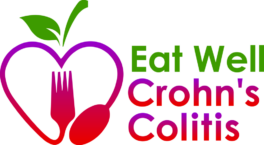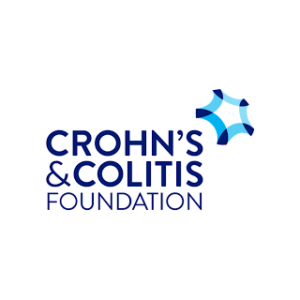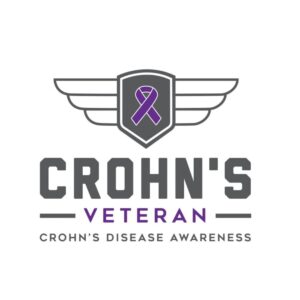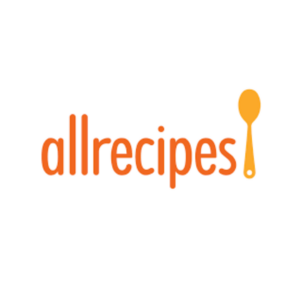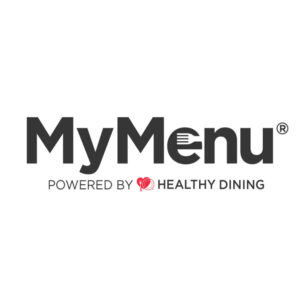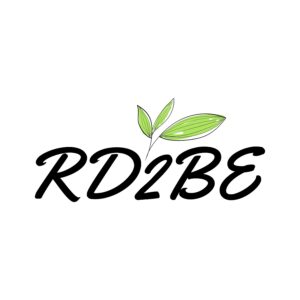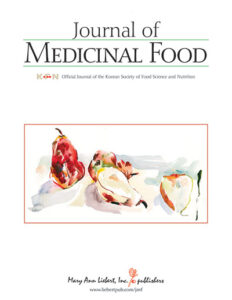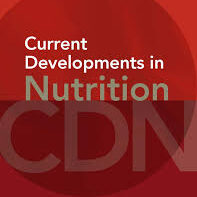7-Day Meal Plan for Crohn’s Disease and Ulcerative Colitis
Danielle Gaffen, MS, RDN, LD
- Last Updated
This 7-day meal plan for Crohn’s disease and ulcerative colitis will help guide you through your dietary needs. You’ll have peace of mind knowing these foods have anti-inflammatory properties and are easier to digest.
Crohn’s disease and ulcerative colitis are types of inflammatory bowel disease (IBD) with symptoms such as persistent diarrhea, rectal bleeding, abdominal pain, and nausea. While primarily affecting the GI tract, IBD can also cause broader health issues, including weight loss, fatigue, and nutrient deficiencies.
Living with Crohn’s or colitis means meal planning can be a real challenge. It’s not always clear what is the best meal for someone with Crohn’s or colitis. Some foods might make your symptoms and inflammation worse, which is why a meal plan for Crohn’s disease and colitis can help. Before we dive into the 7-day meal plan, it’s important to cover some key elements that go into choosing the foods you enjoy.
Download The Full Meal Plan
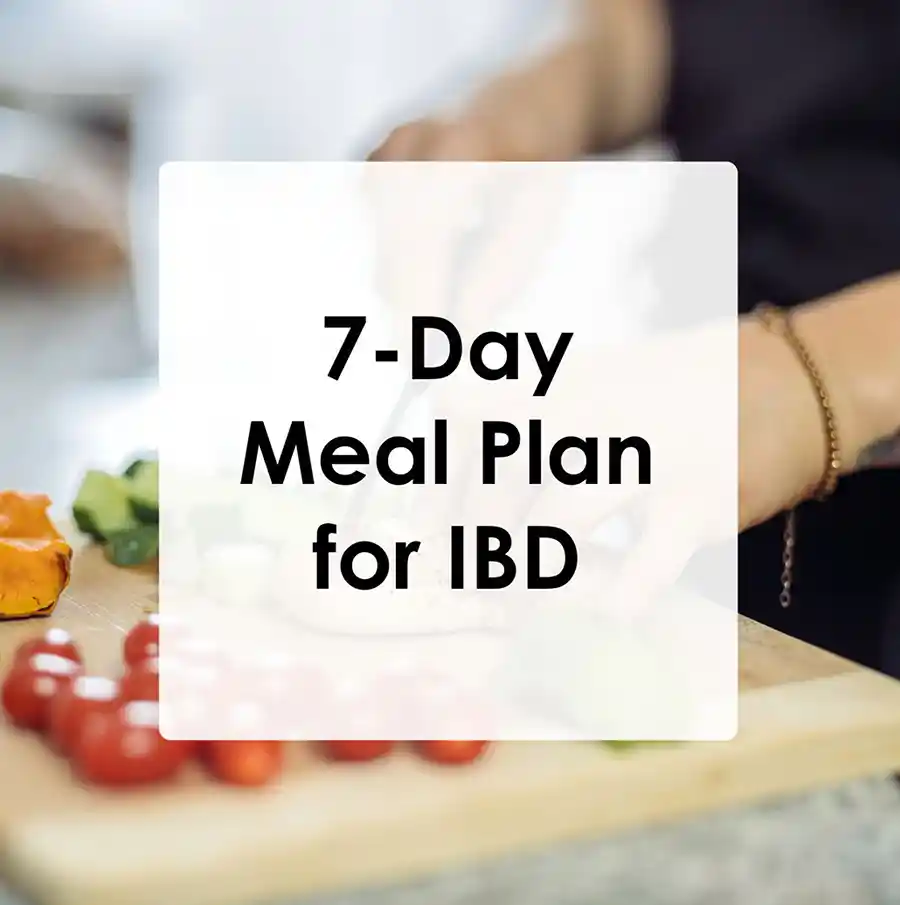
Below is an overview of what a 7-day meal plan includes, and my dietitian insight as to why those ingredients are included. This meal plan with complete recipes can be purchased as a PDF download.
Understanding What to Eat with Your Symptoms
If you’re flaring or experiencing increased symptoms, inflammation, and disease activity, consider taking your diet back to basics. The texture of what you eat matters. Soft-cooked or mashed foods might be helpful during these times. When your symptoms start improving, you can slowly re-introduce a wider variety of foods and textures.
However, remember to be cautious with foods very high in dietary fiber or fat. These might be harder to digest. When you’re in remission and feeling better, you can eat a wider variety of foods. Always monitor how your gut reacts, especially to potential trigger foods.
Wondering what to eat and when? That’s what our Crohn’s disease and ulcerative colitis meal plan is for!
Please note: Everyone’s gut is unique, especially with IBD. If a certain food causes problems for someone else, it might be okay for you. So, when you introduce a new food, pay attention to any changes, and keep track of symptoms with a tool like a symptom food journal.
If you’re feeling unsure about your diet, it’s always advisable to consult with a dietitian who specializes in IBD.
Dietary Basics for Crohn’s Disease and Ulcerative Colitis
Good nutrition is important for people with IBD. This is because IBD can reduce your appetite while your body is also in need of additional nutrients. Additionally, intestinal inflammation and common symptoms like diarrhea can make it harder for your body to absorb the nutrients it needs.
Eating a variety of foods, like lean proteins, herbs and spices (being mindful of hot or spicy ones), produce, and grains, can provide your gut with essential and anti-inflammatory nutrients.
Common Trigger Foods and Substitutes
It’s worth noting that while some foods are commonly known as trigger foods, reactions can vary from one person to another. For example, dairy, spicy foods, and certain foods high in insoluble fiber might be problematic for some. In such cases, lactose-free alternatives, milder but still flavorful herbs and spices, and well-cooked vegetables might be better tolerated.
The Role of Anti-Inflammatory Foods
The benefits of incorporating anti-inflammatory foods cannot be stressed enough, especially for individuals with Crohn’s or UC. Foods like turmeric, ginger, and berries contain properties that help reduce inflammation in the body, promoting better gut health. Incorporating these into your daily meals can significantly aid in symptom management and overall well-being.
7-Day Meal Plan for Crohn’s Disease and Ulcerative Colitis
This 7-day plan, tailored for those with Crohn’s or ulcerative colitis, comes from Eat Well Crohn’s Colitis recipes. These are just a few ideas to guide you. For the complete recipes with step-by step guidance, download the 7-day meal plan.
Disclaimer: While this 7-day meal plan can serve as a helpful starting point, it’s important to remember that each person’s gut with IBD is unique. If certain complications, such as stricturing or narrowing of the intestines, are present—especially in Crohn’s disease in the small intestine—it becomes critical to work closely with your IBD healthcare team. They can provide guidance on any nutrient limitations, like strict amounts of fiber recommended per day, ensuring that the dietary plan is both safe and effective for your specific health situation.
Day 1
- Breakfast: Oatmeal Cookie Smoothie
- Lunch: Tuna, Rice & Cucumber Bowl
- Dinner: Baked Chicken & Carrots with Cilantro Lime Sauce. Side of Mashed Potatoes.
- Snacks: Salt n’ Vinegar Hard Boiled Eggs, Applesauce & Yogurt
- Dessert: Cantaloupe Sorbet
Day 2
- Breakfast: Oatmeal Cookie Smoothie
- Lunch: Tuna, Rice & Cucumber Bowl
- Dinner: Baked Chicken & Carrots with Cilantro Lime Sauce. Side of Mashed Potatoes.
- Snacks: Salt n’ Vinegar Hard Boiled Eggs, Applesauce & Yogurt
- Dessert: Cantaloupe Sorbet
Day 3
- Breakfast: Bell Pepper & Spinach Egg Bake; Rice Cereal with Peaches
- Lunch: Chicken & Zucchini Skillet, with Steamed White Rice
- Dinner: Salmon Cakes and One Pot Potato & Carrot Soup
- Snacks: Chocolate Peanut Butter Energy Bites, Banana with Creamy Peanut Butter Dip
- Dessert: Creamy Avocado Popsicles
Day 4
- Breakfast: Bell Pepper & Spinach Egg Bake; Rice Cereal with Peaches
- Lunch: Chicken & Zucchini Skillet, with Steamed White Rice
- Dinner: Salmon Cakes and One Pot Potato & Carrot Soup
- Snacks: Chocolate Peanut Butter Energy Bites, Banana with Creamy Peanut Butter Dip
- Dessert: Creamy Avocado Popsicles
Day 5
- Breakfast: Bell Pepper & Spinach Egg Bake; Rice Cereal with Peaches
- Lunch: Chicken & Zucchini Skillet, with Steamed White Rice
- Dinner: Salmon Cakes and One Pot Potato & Carrot Soup
- Snacks: Chocolate Peanut Butter Energy Bites, Banana with Creamy Peanut Butter Dip
- Dessert: Creamy Avocado Popsicles
Day 6
- Breakfast: Hashbrown Egg Cups with Veggies
- Lunch: Ground Turkey & Veggie Stir Fry
- Dinner: Baked Cod & Veggies with Quinoa
- Snacks: Lucky Green Smoothie, Applesauce
- Dessert: Peanut Butter Banana Heart Cookies
Day 7
- Breakfast: Hashbrown Egg Cups with Veggies
- Lunch: Ground Turkey & Veggie Stir Fry
- Dinner: Baked Cod & Veggies with Quinoa
- Snacks: Lucky Green Smoothie, Applesauce
- Dessert: Peanut Butter Banana Heart Cookies
Handy Meal Tips
- Frozen Veggies: They’re just as nutritious as fresh ones and last longer.
- Ready-to-Eat: Some foods are prepped and ready. Just check the label to make sure they’re good for your diet.
- Cook Ahead: Make lots of food at once and freeze the extras.
- Talk to Your Family: Share your diet needs with them. Meals are easier when everyone knows.
Importance of Hydration
Staying hydrated is essential as even mild dehydration can lead to fatigue. Drink 8 or more cups of liquids per day, and for every episode of loose, watery stool, add one to two cups of liquids to your daily intake to replace losses. Options include water, herbal tea, broth, a mix of fruit and veggie juice, and oral rehydration solutions. Infused waters and herbal teas can also serve as flavorful alternatives.
Full Plan, Ready to Go!
Need the full scoop? Download the detailed 7-day meal plan for Crohn’s disease. You’ll find a shopping list, detailed recipes, and more.
Take Home Message
Navigating meals with Crohn’s disease or ulcerative colitis can seem daunting. But a good plan, like our Crohn’s disease and ulcerative colitis meal plan, can help simplify things. Remember, everyone’s needs are unique. It’s okay to adjust the plan based on what works for you. If you’re unsure about something, don’t hesitate to reach out to an IBD dietitian for guidance. We’re here to help!
Want More Guidance?
While this 7-day meal plan provides a solid starting point, managing Crohn’s disease or ulcerative colitis often requires a comprehensive approach.
For further assistance, additional resources, and actionable steps, check out our IBD services page. Let us help you navigate your journey with Crohn’s and colitis more effectively.
